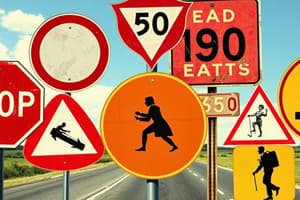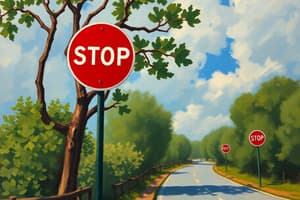Podcast
Questions and Answers
What does a Sharp Curve Sign indicate?
What does a Sharp Curve Sign indicate?
- Prepare for a sharp curve ahead (correct)
- Road work ahead
- Yield to pedestrians
- No parking
What should you do at a flashing red light?
What should you do at a flashing red light?
Stop-go when the way is clear (same as stop sign)
What does a Keep Right Sign mean?
What does a Keep Right Sign mean?
- Yield to oncoming traffic
- Always drive on the left side
- Keep right at the fork (correct)
- Change lanes frequently
What does a Lane Ends sign indicate?
What does a Lane Ends sign indicate?
What should you do when you see Slow Moving Equipment?
What should you do when you see Slow Moving Equipment?
What does a Narrow Bridge sign indicate?
What does a Narrow Bridge sign indicate?
What characterizes uncontrolled intersections?
What characterizes uncontrolled intersections?
What is a driver error that may cause a negative reaction by other drivers?
What is a driver error that may cause a negative reaction by other drivers?
When are drivers more likely to become drowsy while driving?
When are drivers more likely to become drowsy while driving?
What are the max speed limits in cities and towns?
What are the max speed limits in cities and towns?
What is the recommended technique for backing into angled parking?
What is the recommended technique for backing into angled parking?
What is a weave lane?
What is a weave lane?
What should you remember about night driving?
What should you remember about night driving?
What does Space Management involve?
What does Space Management involve?
What should you do when driving in fog?
What should you do when driving in fog?
What is the recommended following distance?
What is the recommended following distance?
What does checking blind spots involve?
What does checking blind spots involve?
What is the procedure for merging onto a freeway?
What is the procedure for merging onto a freeway?
What should you do for emergency vehicles?
What should you do for emergency vehicles?
What does a shield-shaped sign represent?
What does a shield-shaped sign represent?
What are common driving distractions?
What are common driving distractions?
What should you do at a flashing red signal?
What should you do at a flashing red signal?
What shape is a warning sign?
What shape is a warning sign?
What is the primary focus of traffic laws?
What is the primary focus of traffic laws?
How can you prevent skidding?
How can you prevent skidding?
What does a circle sign indicate?
What does a circle sign indicate?
What is hydroplaning?
What is hydroplaning?
What is a Limited Learner's Permit?
What is a Limited Learner's Permit?
What do regulatory signs indicate?
What do regulatory signs indicate?
What is the age range for a Level 2 Provisional License?
What is the age range for a Level 2 Provisional License?
Flashcards
Sharp Curve Sign
Sharp Curve Sign
Alerts drivers to slow down due to a sharp bend in the road.
Flashing Red Light
Flashing Red Light
Functions like a stop sign; drivers must stop and proceed when the way is clear.
Keep Right Sign
Keep Right Sign
Instructs drivers to keep to the right side of the road.
Lane Ends Sign
Lane Ends Sign
Signup and view all the flashcards
Slow Moving Equipment Sign
Slow Moving Equipment Sign
Signup and view all the flashcards
Narrow Bridge Sign
Narrow Bridge Sign
Signup and view all the flashcards
Controlled and Uncontrolled Intersections
Controlled and Uncontrolled Intersections
Signup and view all the flashcards
Driver Error
Driver Error
Signup and view all the flashcards
Drowsy Driving
Drowsy Driving
Signup and view all the flashcards
Speed Limits
Speed Limits
Signup and view all the flashcards
Backing Techniques
Backing Techniques
Signup and view all the flashcards
Weave Lane
Weave Lane
Signup and view all the flashcards
Night Driving
Night Driving
Signup and view all the flashcards
SEE Space Management
SEE Space Management
Signup and view all the flashcards
Driving in Fog
Driving in Fog
Signup and view all the flashcards
Following Distance
Following Distance
Signup and view all the flashcards
Checking Blind Spots
Checking Blind Spots
Signup and view all the flashcards
Merging onto a Freeway
Merging onto a Freeway
Signup and view all the flashcards
Emergency Vehicles
Emergency Vehicles
Signup and view all the flashcards
Shield Shaped Sign
Shield Shaped Sign
Signup and view all the flashcards
Driving Distractions
Driving Distractions
Signup and view all the flashcards
Flashing Red Signal
Flashing Red Signal
Signup and view all the flashcards
Warning Sign Shape
Warning Sign Shape
Signup and view all the flashcards
Focus of Traffic Laws
Focus of Traffic Laws
Signup and view all the flashcards
Preventing Skidding
Preventing Skidding
Signup and view all the flashcards
Circle Sign
Circle Sign
Signup and view all the flashcards
Hydroplaning
Hydroplaning
Signup and view all the flashcards
Limited Learner's Permit
Limited Learner's Permit
Signup and view all the flashcards
Regulatory Signs
Regulatory Signs
Signup and view all the flashcards
Study Notes
Sharp Curve Sign
- Sign alerts drivers to slow down due to a sharp bend in the road.
Flashing Red Light
- Functions like a stop sign; drivers must stop and proceed when the way is clear.
Keep Right Sign
- Instructs drivers to keep to the right side of the road.
Lane Ends
- Indicates that the lane will end and drivers must merge into a different lane.
Slow Moving Equipment
- Sign warns of vehicles that travel at reduced speeds, often used for agricultural or construction equipment.
Narrow Bridge
- Sign indicates a bridge is narrower than the roadway; caution is advised.
Controlled and Uncontrolled Intersections
- Controlled intersections have traffic lights and signs directing traffic flow; uncontrolled intersections lack such controls, requiring drivers to yield as appropriate.
Driver Error
- Common error leading to negative reactions from others: cruising in passing lanes without intent to pass.
Drowsy Driving
- Drivers are more susceptible to drowsiness on high-speed, long rural highways.
Max Speed Limits
- Key limits: 35 mph in cities/towns, 45 mph for school buses, 55 mph for activity buses and outside cities, 70 mph on interstates.
Steering Techniques for Backing
- Angled Parking: Turn the steering wheel in the direction of the angle, check clearance, back into the lane, then straighten.
- Perpendicular Parking: Turn the wheel to back out, check clearance, turn sharply to avoid nearby vehicles.
Weave Lane
- Lane functions as both an entry and exit point for expressways.
Night Driving
- 90% of decisions rely on sight; reduced visibility requires slower speeds. Use headlights properly, dim for oncoming vehicles, and keep the interior light off.
Space Management
- SEE Space Management involves Search, Evaluate, and Execute to ensure safe driving.
Driving in Fog
- Use low-beam headlights, drive slowly, and rely on windshield wipers to maintain visibility.
Following Distance
- Maintain a following distance of 3-4 seconds behind the vehicle in front.
Checking Blind Spots
- Always check over your shoulder in the direction you plan to move.
Merging onto a Freeway
- Identify entrance well in advance, signal, check traffic, and merge safely considering right-of-way for exiting vehicles.
Emergency Vehicles
- Pull to the right side, stop, and ensure to stay out of intersections. Maintain at least a 500-foot distance behind.
Shield Shaped Sign
- Designates interstate highway routes.
Driving Distractions
- Include activities such as talking on the phone, reaching for objects, daydreaming, eating/drinking, adjusting controls, or lighting cigarettes.
Flashing Red Signal
- Requires a full stop and yielding to other traffic/pedestrians before proceeding. Mandatory stop at railroad crossings.
Warning Sign Shape
- Typically diamond-shaped indicating caution or warning of hazards ahead.
Primary Focus of Traffic Laws
- Aims to ensure compliance and reduce traffic incidents through deterrence.
Preventing Skidding
- Slow down and brake lightly to maintain control during slippery conditions.
Circle Sign
- Indicates a railroad crossing.
Hydroplaning
- Occurs when tires lose traction on wet roads, leading to a loss of control.
Limited Learner's Permit
- For ages 15 to under 18; requires a licensed driver in the front seat, limited driving hours, and no cell phone use.
Regulatory Signs
- Indicate what drivers may or may not do, ensuring adherence to traffic laws.
Level 2 Provisional License
- Certain restrictions apply; further information needed for completion.
Studying That Suits You
Use AI to generate personalized quizzes and flashcards to suit your learning preferences.



